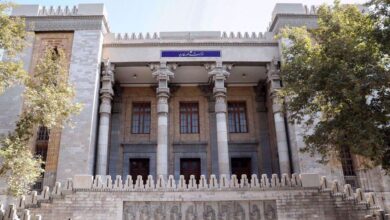Taxing hunger in Iregba, by Lasisi Olagunju

(Published in the Nigerian Tribune on Monday, 13 May, 2024)
“So, where did Tinubu’s Central Bank of Nigeria get its long turenchi demanding that you and I start paying cyber security levies to an office that already has its share of the budget?”
I do not believe that the president of any country will deliberately wreck everything. Their problem may be arrogance or ignorance – or arrogance in ignorance. Or, they may be worshipping wrong gods or feeding their gods with what they must not eat.
You remember Sir Shina Peters’ song for M.K.O. Abiola on the billionaire’s implacable friends who refused to eat his food?
“You gave smooth pounded yam to your friend,
Your friend refused to eat.
You made soft, mushy amala for your friend,
Your friend refused to eat.
You called your friend,
Your friend refused to answer you.
You do not know what they say you did wrong.”
There are at least two sides to a story such as this. Why would I give my friends food and they refuse to eat? Why would I shout their names and they ignore me? Am I calling the right names? If my offerings are right, shouldn’t I then check if they are really my friends?
The ace musician sang that song years before June 12 happened to Abiola. The musician may not know, but that chant is straight from the lore studio of the priests of life.
The foundation story of the song I tell here:
One ancient Yoruba king called Oniregba Osodi, at the beginning of his reign, asked his priests if his era would be peaceful and prosperous. The king was told to take care of all birds in his kingdom because they were hungry and angry and would hurt his happiness.
“What should I do and where are the birds?” the king should ask that question but he did not ask. He was the smartest and the wisest human being around, so he thought.
Instead of asking for directions, the king announced that he knew the road and blurted out orders. He commanded every man and woman in his kingdom to bring out all their grains and feed their ducks and fowls. The people brought out their corn and guinea corn and fed their ducks and pigeons, chicks and chickens.
The king was happy and satisfied.
But, the real hungry, angry birds were looking and watching.
“This oba is king also in idiocy,” they concluded and resolved to teach the powerful how to be wise.
Then, they struck. Nothing Oniregba did amounted to anything. He moved from market to farm, all was in vain. His efforts were like Abiku’s bangles in Soyinka’s lines. He sent his servants on an errand, they did as Alaafin Aole’s spell ordered them: The messengers did not come back. They even did worse. They created their own message, like Afonja did, and delivered the same to an audience different from their lord’s. Wracked by hunger and want, shouts of “ebi npa wá” rent the town while disease and death and general pestilence reigned.
In the midst of the commotion, the sad king, in tears, challenged his priests on the failure of their prescription. “False prophets,” he called them.
They replied the king that he did not feed the birds as they counseled him to.
He said he did. They told him he didn’t.
The king gave a detailed account of his specific orders and how they were carried out.
The priests exchanged looks and laughed. They told the king: “Kabiyesi, you offered the wrong sacrifice to the wrong birds in the wrong place.”
The wise ones moved near the king and, in plain language told him who was hungry and angry and needed to be fed. He wondered why the priests did not tell him this the other time; the priests reminded him of his haste, his arrogance, ignorance and lack of decorum. “You didn’t wait and didn’t ask,” they told him. The king’s royal head wisened. He was sober. Now, he did what the priests told him to do. He didn’t have to wait long before his salvation came. His reign was long in peace, happiness and prosperity.
And, so, in Iregba till tomorrow is the song:
We made smooth and soft pounded yam,
We gave the birds of Iregba,
The birds said no, they won’t eat.
We rolled out pots of succulent amala for the birds of Iregba,
The birds said it was not their food,
They refused to eat…
When we gave the right meals to the big birds,
They ate and chirped with joy…
I did not make this story up. If you are a Yoruba and you are like me with a knowledgeable ancestor, consult him. Even if the forebears are like mine, long dead, their undying spirit should whisper to you the truth in the tale. But if you have no father and no mother, and you have no idea where their bones rest, put a call through to Professor Wande Abimbola. He has the knowledge. Or you can go to Chief Yemi Elebuibon in Osogbo. The tale is his to retell. He has a fuller version recorded in one of his books.
Except he retraces his steps and changes the deity he serves, by the time Alhaji Bola Ahmed Tinubu ends his tenure, he will be remembered for creating greater misery and more poor people than have ever lived in Nigeria. I don’t think that will be an enviable legacy. But he chose it. Every king writes the history of his era.
When a government neglects the road, opts for the bush and pumps efforts into wrong ideas, what it does is the same as starving the birds of life. Its efforts will, till eternity, roll up and down the hill like the boulder of condemned Sisyphus, the devious tyrant of Ephyra who violated “the sacred hospitality tradition” by killing visitors “to show off his power.”
Let us look at it. You moved the price of petrol from less than N200 to almost N1000 and upended every plan in every home. You pushed the naira tumbling down Mount Everest and clapped for yourself as a man of courage. Your Sango’s stone celts struck the market and shocked food prices beyond the reach of the hungry. People who need food, you continue to feed them hope in poisoned cans of tax, more tax and more levies.
Until now, I never knew that the introduction of taxes and levies could be celebrated as achievements by a government. Our government has that epaulette proudly emblazoned on its right and left shoulders. And we are so pinned down in helplessness.
The history of tax is one of intrigue. In ancient times, it was levy to fight wars. In medieval times, it was what Terence Dwyer (2014) calls “a fee derived entirely from surpluses” – the same thing Adam Smith prescribed as the “ability to pay”. In modern times, tax has become “a burden on production.” Why should people pay tax to an absent government? Tax theorists say tax is payment for government services. In ‘The Birth and Death of Taxes’ (1977) economic historians, Edward Ames and Richard Rapp, trace the history of tax as a feature of government’s economic life. They tell us that there is “a public good called protection, the suppliers of which are called governments.” They say a government “has a monopoly over the supply of protection to its subjects and taxes are the price paid to the monopolist.” They take it further, identifying two kinds of protection: one is defence, the other justice. They say when a threat is from foreigners, there is a demand for defence. When the threat is internal, one group of the same population unleashing threats against another, the good on demand is justice. Both goods should normally be exclusively government products. But, you and I know this may not always be so. A government that provides neither defence nor justice but still demands and collects tax is simply extortionate. In that case, what should the subjects do?
A newspaper on Sunday said the president had halted the proposed collection of cyber security levies from the poor and the rich. If it is true, I salute and thank the president. But, should that demand ever have been contemplated at all? What law backed the collection order in the first place? Who should collect and manage taxes under a just, normal law, the Federal Inland Revenue Service or an office created strictly to advise on security?
While we sheepishly surrender and pour libation to Abuja’s god of extortion, we are being offered as cheap ingredients for money ritual. CBN’s demand for cybersecurity tax from everyone, including sellers of pepper and locust beans, was said to be rooted in the Cybersecurity Act 2015 and its 2024 amendment. But that is not correct. The law mentions neither you nor me, nor the sweaty yam seller next street.
Let us check what the law contains. Section 44 (1) of the Cybersecurity Act 2015 says: “There is established a Fund, which shall be known as the National Cyber Security Fund (in this Act referred to as “The Fund”).” Subsection (2) adds that “There shall be paid and credited into the Fund established under subsection (1) of this section and domiciled in the Central Bank of Nigeria: (a) A levy of 0.005 of all electronic transactions by the businesses specified in the Second Schedule to this Act.” And what is in that Second Schedule? The Second Schedule is plain; it habours neither the jìbìtì nor the rìkísí which we read in the CBN circular. The Schedule says: “Businesses which section 44 (2)(a) refers to are: (a) GSM Service providers and all telecommunication companies; (b) Internet Service Providers; (c) Banks and other Financial Institutions; (d) Insurance Companies; (e) Nigerian Stock Exchange.” The 2024 Act amended the 2015 Act without touching the Second Schedule. Indeed, the Amendment Act reinforces that schedule by prescribing punishments for non-payment of the levy by the businesses so listed (see Subsection 8 of the Amendment Act). So, where did Tinubu’s Central Bank of Nigeria get its long turenchi demanding that you and I start paying cyber security levies to an office that already has its share of the budget?
Apparently some people needed more money for the next night party, they did the maths and felt what the listed companies would pay them wouldn’t be enough for their frolics. They then converted all of us to ‘businesses’ without bothering to tinker with the law as they did in February. They simply asked the CBN to help them rewrite the law with a wordy circular. They did so knowing that we are a conquered people who won’t bother to check what the law truly says.
Even the businesses listed in that cyber security law will argue that they are being unfairly taxed. You would know and agree with them if you apply the theory of tax as payment for public goods. What does the government sell to them that warrant incessant taxation? How many of those businesses get ‘defence’ or ‘justice’ from the government as we know it?
“Nigerians pay one of the highest implicit tax rates in the world — way higher than developed countries,” African Development Bank’s president, Dr. Akinwumi Adesina, cried out in January 2021 at a Federal Inland Revenue Service Tax Dialogue. “Think of it”, he said “they provide electricity for themselves via generators; they repair roads to their neighborhoods, if they can afford to; there are no social security systems; they provide security for their own safety; and they provide boreholes for drinking water with their own monies.” Yet, more taxes and levies are rolled out daily against us like Israeli armoured tanks in Gaza.
We should be afraid. There was a time in France when the people were compelled to purchase salt by the government which also forced them to pay extortionate tax on it. Kings and principalities historically taxed the most important ‘goods’ of life. Salt has always been that important – even the word ‘salary’ is related to salt; you may check the history of its Latin root ‘salarium’. And, so it was heavily taxed. The French called the salt tax la gabelle. Historians Theodore Sands and Chester Higby in 1949 published an article on ‘France and the Salt Tax’. In it, they recall that the history of the gabelle under the Ancien Regime is “largely a story of increasing taxation and flourishing abuses.” They say there was even a king of France who monopolized the sale of salt and made the people pay salt tax without selling salt to them. They add that it was a period when the government was “satisfied to receive the money supplied by the system and forgot the people who paid it.” The repercussion was an insurrection that pillaged the rich and, later, ignited the French Revolution.
Today’s Nigerians are like the birds of ancient Iregba. They are hungry and angry. In his ‘Salt, Politics and the French Revolution’, Toby Jaffe warns that “everyday commodities, including food, have the power to uproot, shatter and recreate societies…The revolutionary events around the salt tax of 18th-century France teach us that something as deceptively simple as salt can be a spark plug for civil unrest and revolution.” Now that Nigeria taxes everything including hunger, may God give us the fortitude to bear what may be coming.









